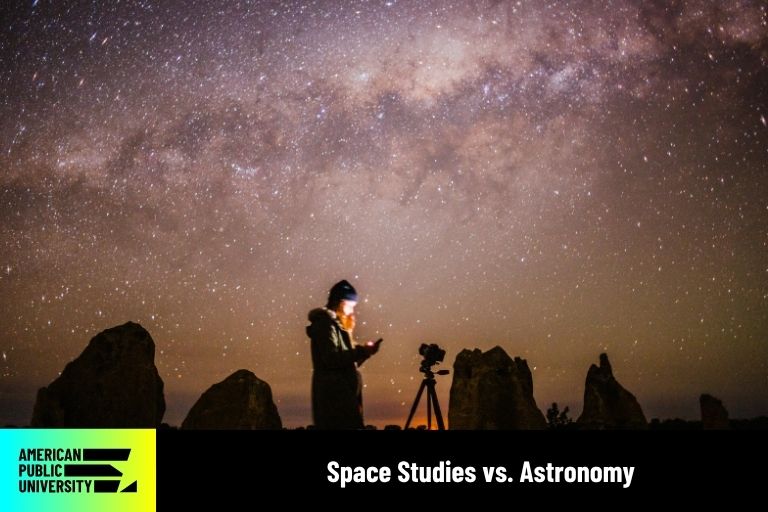08/20/2025

Students interested in exploring the universe often find themselves comparing space studies and astronomy. Both are rooted in natural science and offer exciting opportunities to examine the solar system, celestial objects, and the origins of the universe, but they take distinct approaches.
Whether you're fascinated by infrared astronomy, gravitational waves, or the technology that powers space missions, understanding how these two disciplines differ can help you decide which academic path aligns best with your interests and goals.
What Is Space Studies?
Space studies is an interdisciplinary branch of space science that incorporates a wide range of subjects—from astrophysics, planetary science, and chemistry to space law, engineering, and space operations. It explores not only the science of outer space, but also the policies, logistics, and human challenges associated with space exploration.
A degree in space studies introduces students to subjects such as space physics, atmosphere modeling, celestial bodies, and spacecraft design. Students also explore applied topics such as remote sensing, mission planning, and ethical challenges related to human activity in space.
An important strength of space studies is its focus on integrating technical, scientific, and strategic knowledge. Students may learn about gravitational waves, galaxy evolution, space law, or radiation exposure measurement during human space flight.
What Is Astronomy?
While space studies encompasses many relevant aspects of the space environment, astronomy is focused more narrowly on the scientific study of celestial objects and cosmic phenomena. It’s one of the oldest natural sciences, dating back thousands of years, and it centers on observing and interpreting the light and radiation emitted by stars, planets, galaxies, and other features of the cosmos.
Astronomers use a range of observational tools—from telescope arrays to infrared astronomy and radio wave sensors—to study star formation, black holes, and the physical properties of distant objects. Through these studies, astronomers examine questions like: How did the universe begin? What is the lifecycle of a star? Are there other stars with habitable planets?
An introductory astronomy course gives students foundational knowledge of astronomy, including how astronomers decode light, track celestial motion, and analyze data from the night sky. Students examine the structure of galaxies and use mathematics to understand the physics behind stellar behavior.
Practical Applications of Space Studies and Astronomy
Both astronomy and space studies fall under the broader umbrella of space science, but their practical applications differ in important ways.
- Astronomy often leans toward theoretical research and long-term observational studies. Professionals in this field may work in cosmology, astrophysics, or planetary geology, focusing on interpreting complex phenomena and contributing to our understanding of the universe’s origin and evolution.
- Space studies, by contrast, applies multiple sciences—including chemistry, biology, and engineering—to support space operations, mission development, and technical systems. It includes planning for spacecraft, understanding space environments, and collaborating with space agencies and engineers.
In essence, astronomy helps us ask "what's out there?" while space studies helps us ask "how do we get there, and what do we do once we arrive?"
Career Opportunities in Space Studies and Astronomy
While both fields can lead to careers in space science, the roles and responsibilities often differ.
Students pursuing astronomy may go on to become:
- Observational astronomers
- Astrophysicists
- Telescope instrumentation specialists
- Research scientists at observatories or universities
These roles typically involve analyzing data, running simulations, and developing models to interpret how stars, galaxies, and gravitational forces behave.
Graduates with a space studies degree may be qualified to pursue careers such as:
- Space mission analysts
- Systems engineers
- Space policy advisors
- Science educators or communicators
- Specialists in planetary science, space physics, or human space flight
Space studies graduates often work with interdisciplinary teams, applying their understanding of physical properties, astronomy, and engineering to solve problems and support real-world space missions.
Academic Training and Educational Focus
Both fields require strong backgrounds in physics, mathematics, and data analysis. However, the academic focus differs:
- Astronomy degrees emphasize observational techniques, cosmology, and theoretical frameworks that explain how celestial objects behave.
- Space studies degrees offer a broader interdisciplinary curriculum, touching on space law, orbital mechanics, policy, and engineering.
Advanced space studies courses allow students to demonstrate mastery of these topics through advanced research and applied projects.
Whether analyzing data from a telescope or simulating the launch of a spacecraft, students in both tracks engage with rich scientific material and are encouraged to develop critical thinking, technical writing, and collaborative problem-solving skills.
How to Choose Between Astronomy and Space Studies
If you're drawn to the scientific method, love breaking down data from distant stars, and enjoy asking fundamental questions about the universe, astronomy may be the path for you.
However, if you're interested in space science from a broader angle—including exploration, engineering, and planning, space studies could offer a more dynamic academic experience.
Both disciplines provide insights into the development of space technologies and the future of space exploration. Whether your passion lies in observing other stars or designing systems to support astronauts, there’s a path that fits your goals.
Next Steps in Pursuing a Space Science Education
Deciding between space studies and astronomy comes down to your curiosity, learning preferences, and long-term aspirations. Astronomy centers on studying the physical properties of celestial objects—uncovering how they form, evolve, and influence each other. Space studies takes a broader view, linking natural science with real-world applications in exploration, technology, and policy.
These opportunities allow graduates to explore the universe through both theoretical and applied lenses, engaging deeply with both the science and practical challenges of space. Whichever field you choose, your journey into space science begins with asking the right questions, and pursuing the education that helps you answer them.
Learn how to turn your passion into a profession and explore "How To Become A Space Studies Specialist".